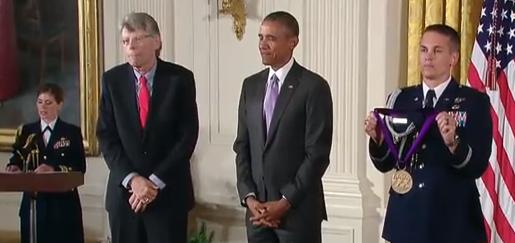In an Uncertain World, White House Honorees Give Us Our Humanity Anew
By • September 18, 2015 0 1278

Every day, the world gives us pause in its news and cause for concern: images of thousands of refugees fleeing war-blasted countries of which they are citizens, trying to save themselves from destruction and death, hoping for something safer and better, give pause and cause.
We look around us and see an electoral process in this country that seems to be frayed at its center and around the edges, in which traditional candidates, otherwise known as politicians, are attacked and greeted with skepticism and anger and the so-called non-professionals are revered for their anti-government postures and attitudes as much as any experience or wisdom they might have.
We seek solace in our friends and families, even our pets, and the athletes, movie and rock stars and celebrities whom we reward unreasonably with unreasonable wealth and unreasonable fame.
With these concerns in mind, it seemed as if a blessing to watch 19 individuals and two groups honored in the East Room of the White House—on Sept. 10, the day just before 9/11 was remembered officially once again. They were given the National Medal of Arts and National Humanities by President Barack Obama, who said of the honorees: “They all have one thing in common. They do what they do because of some urgent, inner force.”
The president arrived in an almost jaunty manner, as if the occasion provided a relief from the pressures of his daily duties and an energy boost. “I love these occasions,” he said. “I love being with writers.”
A number of writers were among those honored, as well as musicians and performers, actors and actresses, directors, choreographers, filmmakers, visual artists, singers beyond category, educators, historians, philosophers, architects and scholars. These were the people in our society who amounted to our modern prophets and visionaries, the thinkers, the imaginers, the seers and creators who enrich our lives with music, poems, designs of buildings, who prod our own imagination with salve and hope, who make us see things that we remember from our own dreams. These are the men and women who urge us on, lift us up, help us understand our lives and aspects of ourselves and others, and the connections that bring us together.
Sometimes, as the president noted about novelist Stephen King, they “even scare us.” King, resplendent in sage-grey hair and a bright tie, has done this for decades even as an accumulation of his novels that frighten and enlighten (“The Stand,” “Carrie,” “The Shining”) also managed to broaden our knowledge of the American experience of daily life in the small towns in which his books are often set.
It was a diverse representation of humanity which marched up to the podium to receive their medals—composer, singer and performer Meredith Monk, who for years has advanced our ideas about just what singing is with her unique vocals and compositions, for instance. There was the remarkable presence of writer, sometimes novelist, but always natural naturalist and philosopher and poet of the real and natural world Annie Dillard, now white haired but still an impressive, charismatic force which always shined through books like “Pilgrim at Tinker’s Creek.”
There was Larry McMurtry, an author whom Georgetowners might remember for his rare book shop in Georgetown just up from 31st and M Streets, not to mention an output of fiction, screenplays, essays and stories. McMurtry was monumental in capturing almost the entirety of the historical and modern experience of the American West, especially the multi-book series headed by “Lonesome Dove,” which also included “Dead Man’s Walk,” “Comanche Moon” and “Streets of Laredo,” all of which chronicled the lives of Texas Rangers Gus McRae and Woodrow Call. McMurtry also wrote the novel from which the Paul Newman starred “Hud” derived and won an Oscar for Best Screenplay for “Brokeback Mountain.”
Other National Medal of the Arts honorees included visual artist John Baldessari, theater director and choreographer Ping Chong, actress and theater founder Miriam Colon, the Doris Duke Charitable Foundation, actress Sally Field (“We like you, we really like you,” the president said, rephrasing one of Field’s two Oscar acceptance speeches), visual artist Ann Hamilton, tenor George Shirley, the University Music Society, and author and educator Tobias Wolff.
National Humanities Medal honorees included historian Evelyn Brooks Higginbotham, the Clemente Course in the Humanities, novelist and philosopher Rebecca Newberger Goldstein, chef and author Alice Waters, architect Everett L. Fly, writer Jhumpa Lahiri, professor and scholar Fedwa Main-Douglas and historian Vicki Lynn Ruiz.
“We celebrate here today our fellow citizens, from all walks of life, who share their gifts with all of us, who make our lives and world more beautiful and richer, and fuller, and I think most importantly, help us understand each other a little bit better,” Obama said. “They help us connect.”

